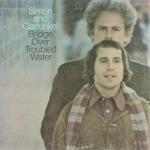 More of the Music of Simon and Garfunkel
More of the Music of Simon and Garfunkel
Reviews and Commentaries for Bridge Over Troubled Water
One of the most interesting findings in this shootout was that no Red Label copy scored as high as the best 360 Label copies. The later labels can be very clean and clear, but ultimately they lack the midrange magic, warmth and sweetness of the best early pressings.
Since this recording has a problem in all those areas to start with, most red label copies suffer from a pronounced deficit of Simon & Garfunkel magic, the kind of magic that is so wonderfully evident on their two previous outings: Parsley, Sage… and Bookends.
The Last of the Four Track Recordings
Why do the two previous albums have more magic?
They’re simpler productions, the kind that can be handled by the four track machine they were recorded on.
Bridge, on the other hand, is the boys’ Grand Musical Statement for All Time, with production and scope far exceeding their previous work. Like the Beatles with Abbey Road, they gave it their all and went out on a high note. (The Beatles planned it that way, while S and G fell victim to their ambition, which you can read about in the AMG review below.)
What a Masterpiece they achieved. Ten weeks at Number One on the charts. Depth and breadth of material only hinted at on their earlier efforts.
Who can argue with this as one of the most important achievements in popular music of the last fifty years? [Make that sixty.]
It’s on this short list for a reason.
Back Away From The Console
The sonic problems and promise of the multi-track approach can both be heard in one track: The Only Living Boy In New York. The song starts out simply, focusing on the duo’s lovely voices, with only minimal instrumentation. It sounds PHENOMENAL on the best pressings, and very good on even the typical copies. Halfway through the song, heavy-handed production kicks in, and the sound suffers significantly. You can’t fault the band for going big, but nor can you blame audiophiles for wishing they had kept it simple.
A Price Must Be Paid
This kind of musical and sonic complexity has a price. Play the ending to the title song and you will hear immediately what I mean. They had only four tracks to work with, not enough to squeeze all the sounds they wanted to record, so compromises were made. Reductions of four tracks into one were done numerous times. This process leaves three fresh tracks of tape for more overdubs, but adds a generation of tape to the tracks that were reduced. Those extra generations of tape cause the added problems one hears on the big production songs on this album and Bookends as well. (Save the Life of My Child comes immediately to mind.)
Of course our job is to find the pressing that captures as much of the magic as possible with as little of the distortion. This means three things: proper mastering, good vinyl and tender loving care from previous owners, a tough combo but not an impossible one we’re happy to say.